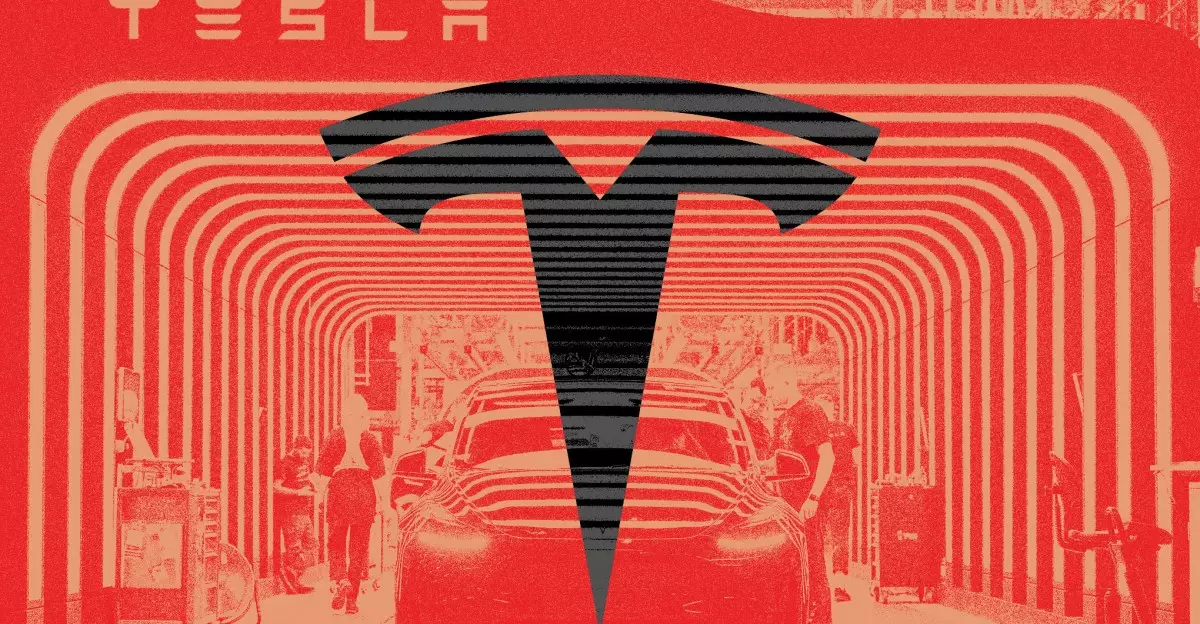Tesla’s recent sales report reveals a startling plunge in numbers, with European sales dropping nearly 50% year-over-year. This alarming statistic should not only concern investors but also serve as a wake-up call for the company. Despite an overall increase in the electric vehicle (EV) market—battery electric vehicle sales surged by 26.4% in Europe in the same timeframe—Tesla is floundering. The stark contrast highlights deeper issues embedded within the Tesla brand, particularly in how it connects with consumers and adapts to an evolving automotive landscape.
The European market, which demands unique strategies tailored to specific consumer preferences, has seemingly turned its back on Tesla. For a company that has long prided itself on innovation and a robust supply chain, the inability to meet consumer expectations in a critical region is a significant oversight. It raises questions: What has changed so drastically in such a short span of time, and how did a brand once synonymous with electric vehicle success fall so far from favor?
Shifting Competition Landscape
The avalanche of competition from both domestic European manufacturers and burgeoning Chinese brands has exacerbated Tesla’s plight. Brands like Volkswagen and BMW are ramping up their own EV offerings, each introducing lightweight, aesthetically pleasing, and performance-driven models that resonate with environmentally conscious consumers. With options ranging in price and feature set, Tesla has faced a hard reckoning—failing to distinguish itself amidst an ever-diversifying landscape.
Moreover, the allure of the relatively new Chinese electric vehicle manufacturers, whose capabilities in cutting-edge technology and competitive pricing are challenging Western brands, poses a critical threat to Tesla’s market position. The looming question is whether Tesla, under Musk’s management, can pivot effectively to fend off this tide of competition or if it remains entrenched in its ways, a formula that seems increasingly outdated.
The Political Quagmire
Musk’s recent political engagements have muddied Tesla’s brand waters further. His vocal support of controversial political figures seems to have backfired spectacularly, alienating a segment of consumers that values corporate neutrality and social responsibility. While fostering connections with governmental entities might yield short-term benefits, the long-term repercussions of alienating audiences through political affiliation could be devastating.
Surveys show a notable decline in Musk’s favorability, now down to 39% amidst accusations of large-scale inconsistency. Associating Tesla’s brand with Musk’s political musings may have tainted it in the eyes of European consumers, affecting brand loyalty and sales performance significantly. Rather than enhancing his brand persona, it appears those efforts are perceived as distractions from the essential business of delivering quality electric vehicles.
Consumer Disconnect
What is particularly telling is that consumers aren’t souring on electric vehicles themselves—they’re turning away from Tesla. The refreshed Model Y was expected to play a pivotal role in rekindling interest, but the launch appears to have flopped. Instead of a resurgence, Tesla is witnessing an erosion of trust, signaling that consumers may feel disconnected from the brand’s mission or quality of product.
As consumers become increasingly informed and discerning about their purchases, they expect companies to engage authentically rather than relying on the charisma of a single individual. Tesla’s potential decline could be linked to failure in understanding and implementing effective brand strategies that resonate with this rapidly evolving consumer base.
Future Implications
Musk’s recent statements about reducing engagement in political matters and focusing on Tesla’s core business indicate an acknowledgment of the need for change. However, given his simultaneous commitment to projects such as AI and robotics, it remains unclear if Tesla will effectively navigate the storm. The leadership must recalibrate its strategy—the stakes are enormous, not just for company stability but for the electric vehicle revolution itself.
As it stands, Tesla stands at a crossroads. The company must reevaluate its approach to innovation, consumer engagement, and market position. The question is whether it possesses the adaptability to reclaim its throne in the electric vehicle arena or whether it will become a cautionary tale of success turned to struggle, all in the shadow of its emblematic leader. The resilience of Tesla’s brand rests on more than just the vision of Elon Musk; it hinges on its ability to listen, adapt, and inspire consumer confidence in an increasingly complex automotive landscape.

